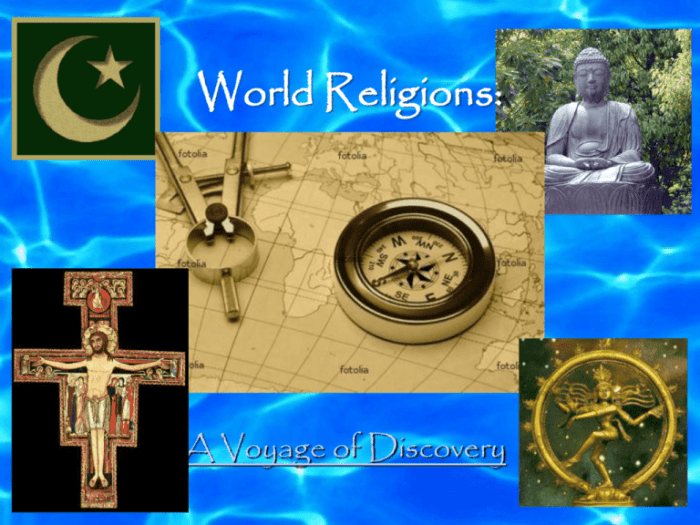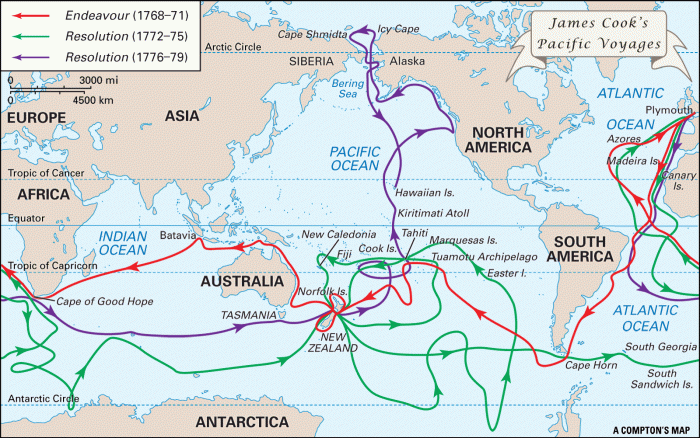World religions a voyage of discovery sets the stage for this enthralling narrative, offering readers a glimpse into a story that is rich in detail and brimming with originality from the outset.
This comprehensive guide explores the origins, beliefs, practices, and cultural impact of the world’s major religions, providing a nuanced understanding of their profound influence on human history and contemporary society.
Introduction to World Religions: World Religions A Voyage Of Discovery

World religions refer to a group of influential and widely practiced religious traditions that have shaped human history and culture for centuries. These religions are characterized by their well-defined beliefs, rituals, and ethical teachings, and they play a significant role in the lives of their adherents.
The origins and historical development of world religions are diverse, with some tracing their roots to ancient civilizations while others emerged more recently. Over time, these religions have undergone significant transformations, adapting to changing social and cultural contexts while preserving their core teachings.
Major World Religions
| Religion | Beliefs | Practices | Rituals |
|---|---|---|---|
| Buddhism | – Four Noble Truths- Eightfold Path | – Meditation- Mindfulness | – Buddha’s Birthday- Vesak |
| Christianity | – Trinity- Jesus Christ as the Messiah | – Prayer- Sacraments | – Christmas- Easter |
| Hinduism | – Brahman- Karma and reincarnation | – Yoga- Puja | – Diwali- Holi |
| Islam | – Five Pillars- Muhammad as the Prophet | – Salat- Fasting | – Eid al-Fitr- Eid al-Adha |
| Judaism | – One God- Torah | – Shabbat- Kosher | – Passover- Rosh Hashanah |
Sacred Texts and Beliefs
World religions possess a wealth of sacred texts that serve as the foundation for their beliefs and teachings. These texts, such as the Bible, Quran, and Bhagavad Gita, contain stories, parables, and ethical guidance that shape the lives of their adherents.
The core beliefs of world religions often center around concepts such as the nature of God, the meaning of life, and the path to salvation. These beliefs provide a framework for understanding the world and guide individuals in their spiritual journeys.
Religious Practices and Rituals
Religious practices and rituals are an integral part of world religions. They provide a means for adherents to express their faith, connect with the divine, and build a sense of community.
Practices such as prayer, meditation, and fasting are common to many religions. Rituals, such as baptisms, weddings, and funerals, mark significant events in the lives of believers.
Influence on Culture and Society
World religions have had a profound impact on culture and society throughout history. They have shaped art, architecture, literature, and music. Religious beliefs and practices have also influenced social structures, legal systems, and educational institutions.
The teachings of world religions often emphasize compassion, forgiveness, and social justice. These principles have inspired countless individuals to work towards a more just and equitable world.
Interfaith Dialogue and Understanding, World religions a voyage of discovery
In an increasingly interconnected world, interfaith dialogue and understanding are essential for promoting tolerance and harmony. By engaging in respectful conversations, people of different faiths can learn from one another and dispel misconceptions.
Numerous initiatives and organizations are dedicated to fostering religious coexistence. These efforts include interfaith councils, educational programs, and community events that bring people of different backgrounds together.
Contemporary Issues and Challenges
World religions face a number of contemporary issues and challenges, including religious extremism, secularization, and the role of religion in public life.
Religious extremism, fueled by fundamentalism and intolerance, poses a threat to peace and stability. Secularization, on the other hand, refers to the decline of religious influence in society.
Questions Often Asked
What is the significance of studying world religions?
Studying world religions provides a comprehensive understanding of human beliefs, values, and practices, fostering tolerance, empathy, and cultural appreciation.
How do world religions influence culture and society?
World religions have profoundly shaped art, literature, music, architecture, and social structures, leaving an enduring legacy on human civilization.
What are the key challenges facing world religions today?
Contemporary issues such as religious extremism, secularization, and the role of religion in public life pose significant challenges to world religions, requiring dialogue and innovative solutions.

